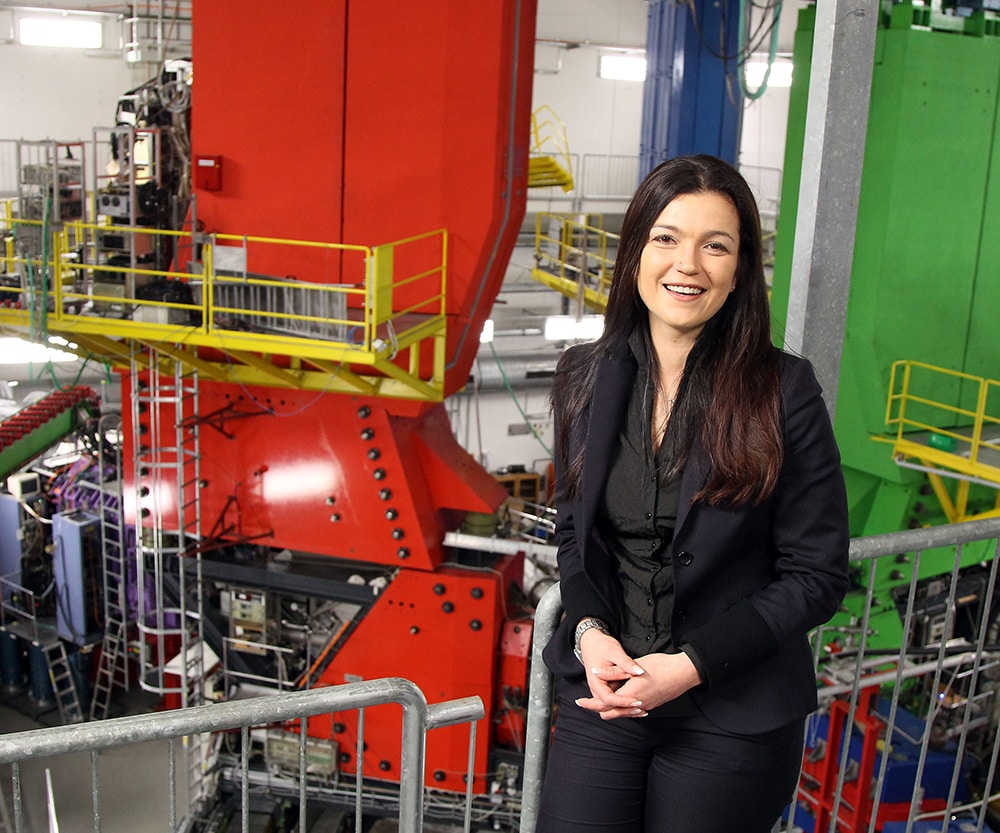Physics professor, nuclear physicist in love with science!
Concettina Sfienti (44) is professor of nuclear physics and currently Dean of the Faculty of Natural Sciences at JGU. In spring 2018, she and her team will be hosting the first Physics Master Academy, an innovative 5-week program with exciting lectures, methods courses, and practical lab work for advanced BSc students and graduates. How did the idea emerge and what is Sfienti’s personal vision for educating young talents in physics?
Inspiring Physics: Did you participate in summer schools or academies like the one you are planning for JGU now? Concettina Sfienti: Actually, no! I was still trained in a different generation. We did not necessarily think much about our career steps and whether or not we should really get a Master’s degree. We simply did it because it felt like a self-evident responsibility. Maybe, as the daughter of the 60s generation of parents, I was also driven by the idea to set an example as a woman.If the idea did not originate from your own experience with academies like this. How did it emerge?
It was at one of the Particle Physics academies that PRISMA is organizing for high school students. I was extremely inspired by the fun that the young people had there. And I thought to myself: “Hey, we should do something like this for our Bachelor students too.” Everything today is so much driven by efficiency criteria and thinking about getting credits to quickly complete your studies. I am not saying that this is not important. But I wanted to create an opportunity for students to advance in their studies while still having fun.
So, the academy is all about having fun? I cannot really believe that…
Laughing. Well, the academy indeed has a full program with advanced lecture classes and the participants also have the opportunity to work on their own projects in the lab groups. All this also means a lot of work within a fairly short period of five weeks. But there is nothing wrong with having fun while doing research as a student. And we also offer cultural outings and networking events to create a balance between learning and ‘partying.’
What happens if the students like it here in Mainz? Can they directly start their MSc degree at JGU?
This is actually one overarching aim of the Master Academy – to build bridges between degrees and crucial career phases. We have already achieved a lot when it comes to making the curriculum and the application deadlines more flexible, especially for international students whose study calendars often do not match with the German academic year. The Academy will be taking place until the end of March in 2018. That gives successful students the chance to directly apply for the MSc in Mainz. And the work they do at the academy prepares them for a fast transition to the Master level.
Did you have professors or mentors who also “built bridges” for your career? After all, you are the first female dean in the entire history of the Natural Science Faculty at our university. I suppose, that did not happen by accident?
You are right, I am the first woman dean here and therefore also a role model for some women in physics and in the sciences at large. But I cannot say that this was somehow strategically planned when I started my career. I am from Italy originally, gained my physics diploma in Germany in the 1990s, and then my PhD in Catania and in the U.S. I had definitely not planned on doing a PhD – but I did because I kept going without thinking too much about it.
How did you end up in Germany?
I did my first postdoc in Germany but then moved back to Italy for my first permanent assistant professorship position. This was a great opportunity because, for example, I also had to teach students in the Department of Environmental Studies. They were not physicists, obviously, so I had to teach them the basics of physics by also learning to look at the field through their eyes. This was like teaching physics from a 360° perspective. I had to not only teach the content but really convince them why physics is important and what it can explain.

That sounds quite difficult given the fact that this was your first professorship position. How did you manage the challenge?
It was not that difficult because the students were so motivated. They wanted to learn and understand. Maybe that is something that gets lost in the current discussions about the education system and the presumed lack of the students’ self-responsibility. My students wanted to learn. I even set up a lab for them and they worked there, sometimes till nine o’clock in the evening. It was a great experience and it also showed something about physics in general. Physics teaches you problem solving by seeing the big picture. You have to concentrate on details but only to fully understand the problem in its entire complexity. This is the most exciting thing about physics and it was also what drove the students back then.
With all the responsibilities you have now, which role does teaching play for you today?
As a scientist, I love my field, I love physics. If you love something, you cannot not talk about it. This is the same in life and in science. Teaching allows you to talk about what you love and pass on this passion to your students.
Website of the Master Academy: https://academy.inspiringphysics.de/ More about Concettina Sfienti on her personal website: http://www.concettinasfienti.com/